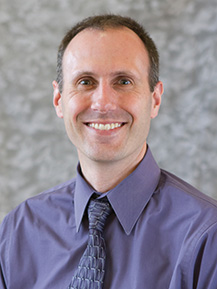Preston Bost
Professor of Psychology, Div III Chair
CONTACT:
Baxter Hall 121
765-361-6248
bostp@wabash.edu
Curriculum vitae

I began teaching at Wabash in 2000, and served as the chair of the Psychology department from 2007-2013. I am currently chair of the Social Sciences division. My area of specialty is cognitive psychology, which employs controlled experimentation to study how people process information about the world around them – how they identify and use objects, navigate their environments, remember their histories, make decisions, solve problems, and make judgments about other people. This area of psychology is closely allied with neuroscience, an area of strength for our department. In addition to my general courses on cognitive psychology, I enjoy teaching about how the science of cognitive psychology can improve the administration of criminal justice – for example, through an understanding of eyewitness memory and jury decision-making.
Outside the classroom, I've served the College in a number of capacities -- as a charter member of our Retention Programming Committee, and more recently as a leader of the College's partnership with the JED Foundation, which promotes best practices in mental health for college students. I also started the College's first permanent Office of Institutional Research in 2014.
Beyond Wabash I dedicate lots of time to sports and fitness, and students find that sports texts and analogies frequently find their way into my teaching. I am also a bit of an automotive buff, occasionally teaching a freshman tutorial course on the history of the automobile in the United States. And a good portion of my down time finds me immersed in the ongoing "golden age" of television drama and television criticism. Shows that I would recommend to a serious fan of television range from the obvious (The Americans, Better Call Saul, Mad Men, The Good Place) to the less so (Station Eleven; GLOW, Bojack Horseman; Terriers). Going back just a few years, the modern canon includes The Wire, Buffy the Vampire Slayer, and the first four seasons of The West Wing.
Finally, I devote time to my wife, Biology professor Anne Bost, my daughter Emily -- now attending Denison University -- and our lovable dog Wilbur. Several times a year, we return to our roots in the Deep South, where we have family in Alabama and the Carolinas.
EDUCATION
Ph.D., Cognitive Psychology, Vanderbilt University, 1998
B.A., Psychology, Yale University, 1993
RECENT COURSE OFFERINGS
Psy 101: Introduction to Psychology
Psy 231: Cognitive Psychology
Psy 201/202: Research Methods and Statistics I and II
Psy 214: Psychology and Law
Psy 223: Abnormal Psychology
Psy 331: Research in Cognitive Psychology
Psy 495/496: Senior Capstone in Psychology
Freshman Tutorial: The Automobile and American Culture
RESEARCH
In recent years, my students and I have been conducting research on the cognitive psychology of conspiracy theories. How do people adopt and hold on to beliefs that appear to contradict available forensic and documentary evidence? Such beliefs are surprisingly easy to acquire, highly resistant to change, and present in cultures all over the world – suggesting that they may derive from cognitive pitfalls that are natural to human thought. Two students and I published a manuscript suggesting that such beliefs may derive in part from a natural tendency to focus on the possible motive of the alleged conspirator, not just on available “hard” evidence.
RECENT PRESENTATIONS
Aug 15, 2019 interview on “The Current,” a Canadian national morning radio broadcast, about the psychology of conspiracy theories following the death of Jeffrey Epstein
Bost, P.R. Where do we go from here? Some thoughts on establishing connections across the research on conspiracy ideation. Invited paper presented at the 2015 University of Miami Conspiracy Theory Conference, March 2015.
Bost, P.R., & Schmitzer-Torbert, N. “Reinvigorating the departmental review process.” Idea Exchange accepted for the annual meeting of the National Institute for the Teaching of Psychology, St. Petersburg, FL, January 2008.
Bost, P.R. “Early and often: Using research experiences in introductory psychology to prepare students for the research methods course.” Midwestern Psychological Society Annual Meeting, Chicago, IL, May 2005.
RECENT PUBLICATIONS
(bold denotes undergraduate co-author)
Bost, P.R. (2019). The truth is around here somewhere: Integrating the research on conspiracy beliefs. In Uscinski, J. (ed.). Conspiracy Theories and the People Who Believe Them. Oxford University Press.
Bost, P.R. (2015). Crazy beliefs, sane believers: Toward a cognitive psychology of conspiracy ideation. Skeptical Inquirer, 39(1), 44-49
Bost, P.R., & Prunier, S.G. (2013). Rationality in conspiracy beliefs: The role of perceived motive. Psychological Reports: Sociocultural Issues in Psychology, 113, 1130-1140.
King, D., & Bost, P.R. (2012) Sex role orientation at single-sex and coeducational colleges. Modern Psychological Studies, 17, 77-81.
Bost, P.R, Prunier, S.G., & Piper, A.J. (2010) Relations of familiarity with reasoning strategies in conspiracy beliefs. Psychological Reports, 107, 593-602.
HONORS AND AWARDS
McLain-McTurnan-Arnold Excellence in Teaching Award, Wabash College, 2023
Certifications:
Open Pedagogy (2023)
Question/Persuade/Refer (2021)
MAJORS & MINORS
AT WABASH
- Accounting (pipeline)
- Art
- Asian Studies (minor)
- Biochemistry
- Biology
- Black Studies (minor)
- Business (minor)
- Chemistry
- Classics
- Computer Science
- Economics
- Education Studies (minor)
- Engineering (dual-degree)
- English
- Environmental Studies (minor)
- Financial Economics
- Film and Digital Media (minor)
- French
- Gender Studies (minor)
- German
- Global Health (minor)
- Greek
- Hispanic Studies
- History
- Humanities
- Latin
- Law (pre-professional)
- Mathematics
- Medicine (pre-professional)
- Modern Languages
- Music
- Neuroscience (minor)
- Philosophy, Politics, and Economics
- Philosophy
- Physics
- Political Science
- Psychology
- Religion
- Rhetoric
- Spanish
- Theater
